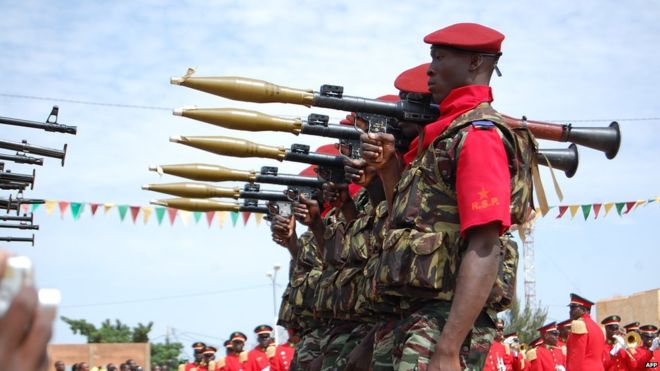Officials in the African nation of Burkina Faso believe members of a former elite presidential security unit are offering their expertise to an increasingly violent Islamist insurgency in the country.
In addition to offering their knowledge and expertise, some believe they are also participating in attacks against civilians and government targets, as part of a growing trend of violent Islamic extremism that has bloomed in the past few years in this part of Africa.
The former unit, called the Régiment de la Sécurité Présidentielle (RSP), or Regiment of Presidential Security, was established in 1987 following a military coup of the government in Burkina Faso, led by a former army officer named Blaise Compaore. Fearing another coup akin to the one he had just led, Compaore established the 1,300-man strong paramilitary organization to serve as his personal protection unit, similar in some ways to the American Secret Service.
However, the unit was equipped, trained, and outfitted to be capable of counter-balancing the military. They reported solely to Compaore as president, and operated above the law in many respects. After their establishment, the RSP was linked to several extrajudicial killings of journalists, activists, and critics of the government.
Ironically, the unit that was established to prevent another military coup in Burkina Faso had members who were twice accused of plotting just such a coup, once in 1996 and again in 2003.
Blaise Compaore was president in Burkina Faso from 1987 to 2014, and only stepped down from power after an uprising against him quashed attempts to extend presidential term limits that would allow him to remain president. Compaore fled the country. However, the RSP remained during the transition period, and after it was recommended they be disbanded, they launched yet another coup in September 2015. After a brief period of fighting, the RSP formally gave up, and they were officially disbanded.
Since that time, violent Islamist terrorism has spread throughout Africa, particularly in neighboring Mali and the Ivory Coast. Al-Qaeda in the Islamic Maghreb has carried out a number of attacks in Burkina Faso since early 2016, killing dozens of civilians and soldiers. Since then, a new group called Ansarul Islam has emerged in the north of the country, led by a radical imam named Ibrahim Malam Dicko.
With the spike in homegrown jihadist terrorism, government officials in Burkina Faso are bringing home forward deployed troops from peacekeeping missions around Africa to refocus on eliminating the threat of Ansarul Islam in the country’s north.
Featured image is of the former RSP, courtesy of the BBC
Already have an account? Sign In
Two ways to continue to read this article.
Subscribe
$1.99
every 4 weeks
- Unlimited access to all articles
- Support independent journalism
- Ad-free reading experience
Subscribe Now
Recurring Monthly. Cancel Anytime.











COMMENTS